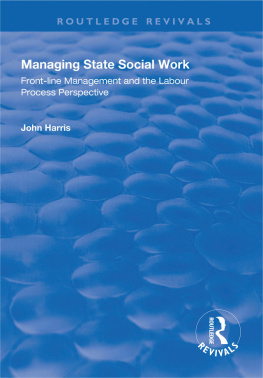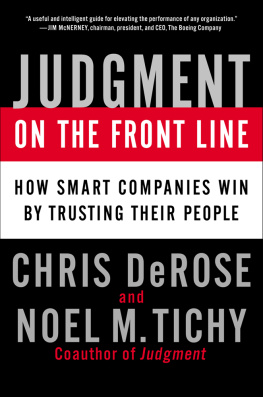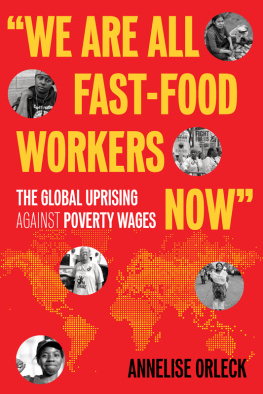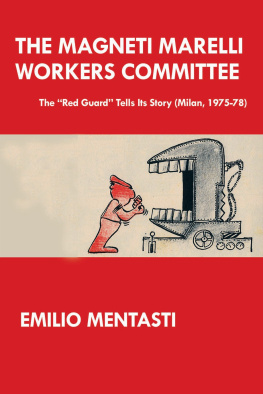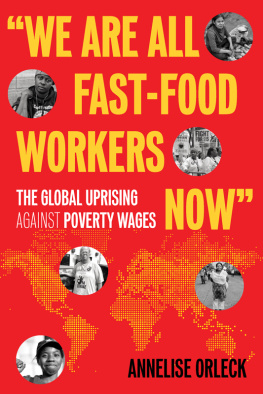FRONT-LINE WORKERS IN THE GLOBAL SERVICE ECONOMY
Walking around the commercial streets of New York, San Francisco, Milan, London, or Paris and looking at the succession of multinational chain stores windows, you can easily forget what country you are in. However, if you hear the small talk among the employees, you hear very different stories. In New York, a 30-year-old woman is worried because she does not know if she will work enough hours to make a living the following weekwhereas, in Milan, a mother of the same age knows she will work 20 hours a week but is concerned about whether her contract will be renewed at the end of the following month.
Following three years of fieldwork, which included 100 in-depth interviews with front-line retail workers and unionists in New York City and Milan, Front-Line Workers in the Global Service Economy investigates both the lived experiences of salespersons in the fast fashion industrya retail sector made of large chains of stores selling fashion garments at low pricesand the possibilities of collective action and structured forms of resistance to these global trends. In the face of economic globalization and vigorous managerial efforts to minimize labor costs and to standardize the retail experience, mass fashion workers stories tell us how strong the pressure toward work devaluation in low-skilled service sectors can be, and how devastating its effects are on the workers themselves.
Giovanna Fullin is an Associate Professor of Economic Sociology in the Department of Sociology and Social Research at University of Milano-Bicocca, Italy.
FRONT-LINE WORKERS IN THE GLOBAL SERVICE ECONOMY
Overshadowed and Overstretched in the Fast Fashion World
Giovanna Fullin
First published 2021
by Routledge
605 Third Avenue, New York, NY 10158
and by Routledge
2 Park Square, Milton Park, Abingdon, Oxon, OX14 4RN
Routledge is an imprint of the Taylor & Francis Group, an informa business
2021 Giovanna Fullin
The right of Giovanna Fullin to be identified as author of this work has been asserted by her in accordance with sections 77 and 78 of the Copyright, Designs and Patents Act 1988.
All rights reserved. No part of this book may be reprinted or reproduced or utilised in any form or by any electronic, mechanical, or other means, now known or hereafter invented, including photocopying and recording, or in any information storage or retrieval system, without permission in writing from the publishers.
Trademark notice: Product or corporate names may be trademarks or registered trademarks, and are used only for identification and explanation without intent to infringe.
Library of Congress Cataloging-in-Publication Data
Names: Fullin, Giovanna, author.
Title: Front-line workers in the global service economy : overshadowed and overstretched in the fast fashion world / Giovanna Fullin.
Description: New York, NY : Routledge, 2021. | Includes bibliographical references and index.
Identifiers: LCCN 2020056770 (print) | LCCN 2020056771 (ebook) | ISBN 9781032005584 (hardback) | ISBN 9781032005591 (paperback) | ISBN 9781003174653 (ebook)
Subjects: LCSH: Retail trade--Employees. | Sales personnel. | Clothing workers. | Clothing trade. | Labor market.
Classification: LCC HD8039.M39 F85 2021 (print) | LCC HD8039.M39 (ebook) | DDC 331.7/93--dc23
LC record available at https://lccn.loc.gov/2020056770
LC ebook record available at https://lccn.loc.gov/2020056771
ISBN: 9781032005584 (hbk)
ISBN: 9781032005591 (pbk)
ISBN: 9781003174653 (ebk)
Typeset in Bembo
by Deanta Global Publishing Services, Chennai, India
To my mom Teresa
CONTENTS
The analytical framework |
Word cloud of Milan and New York workers interviews |
Employment Protection Legislation Index (2013) |
Retail labor force by age (% of total employment by subsector of economic activity and occupation) |
Labor market position of youth in Italy, EU28, and the US (2017) |
Retail labor force by gender (% of total employment by subsector of economic activity and occupation) |
Labor market position of women in Italy, EU28, and the US (2017) (%) |
Retail workers by race |
Employment distribution by tenure-at-current-employer intervals |
Unemployment rate in 2016 by gender and race |
Characteristics of interviewed workers |
The road that led to the publication of this book was long and involved many people. First of all, I feel very indebted to the many salespersons of mass fashion stores in Milan and New York who shared their time, their experiences, and their working lives with me. The core of this book is built on their stories, together with those of trade unionists and activists. I am not sure they will completely recognize themselves in what I wrote but I hope they will be aware of my gratitude.
During the fieldwork and then the writing of this book, I accumulated many debts of gratitude to other scholars, colleagues, and friends whom I am happy to list here. Although the responsibility for what is written remains entirely mine, I like to think of this six years journey as a journey made together with them. I remain strongly convinced that it is only in this waydiscussing with other people, sharing thoughts, and exchanging commentsthat scientific work can make sense and seriously contribute to the existing knowledge. And this is the only way I am able and like to work.
I would like to thank Ruth Milkman, who welcomed me to the Cuny Graduate Center without knowing me and who played a key role in the whole process: the research, the writing, and the publication of this book. I want to thank her for her comments and precise feedback, her support, and her frankness. The encounter with her meant a lot to me.
Emilio Reyneri and Gian Primo Cella read the manuscript in its many versions and were always ready to give me suggestions and support. I thank them both for having accompanied me, tirelessly, on this long journey.
With Diego Coletto, I shared the curiosity for the work of front-line service workers and the exploratory phases of the research, which were crucial to the design of the whole project. It would have been much more difficult and less fun to start this journey alone. Diego too had the patience to read some parts of the manuscript and to give me precious comments, always reminding me where I wanted to go. Mauro Magatti helped me overcome the doubts I had even before the start of this adventure, reminding me that only by leaning toward the unknown could one really create something.
Peter Ikeler was an invaluable support during the research period in New York. It was by chance and thanks to Peters openness that, hardly knowing each other at the time, we had the opportunity of collaborating in a research on the themes I was working on. In addition to having led to a friendship, the encounter with Peter was crucial for my comparative analysis between Italy and the US. I had the opportunity to develop the comparison between Italy and the US as regards industrial relations thanks to the discussions with Peter and Stefano Gasparri, who were ready to invest in a project that we had started without knowing where it would have brought us.


